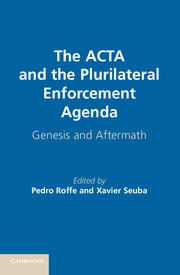Book contents
- Frontmatter
- Contents
- List of Contributors
- Foreword
- Acknowledgments
- Acronyms
- Introduction
- PART I THE FINAL ACT: ITS MAIN FEATURES AND CONTENTS
- PART II DOMESTIC LEGISLATIVE CHALLENGES
- PART III IMPACT ON RELATED PROCESSES
- PART IV VIEWS FROM STAKEHOLDERS: LESSONS
- PART V WHAT LIES AHEAD ACTA
- Annex I Anti-Counterfeiting Trade Agreement
- References
- Index
- References
Introduction
ACTA and the International Debate on Intellectual Property Enforcement
Published online by Cambridge University Press: 05 December 2014
- Frontmatter
- Contents
- List of Contributors
- Foreword
- Acknowledgments
- Acronyms
- Introduction
- PART I THE FINAL ACT: ITS MAIN FEATURES AND CONTENTS
- PART II DOMESTIC LEGISLATIVE CHALLENGES
- PART III IMPACT ON RELATED PROCESSES
- PART IV VIEWS FROM STAKEHOLDERS: LESSONS
- PART V WHAT LIES AHEAD ACTA
- Annex I Anti-Counterfeiting Trade Agreement
- References
- Index
- References
Summary
Framing the Enforcement Debate
The intellectual property enforcement debate is probably less about the goals than the methods used to achieve those goals. In effect, while it seems irrefutable that “the attractiveness of intellectual property rights risks being seriously undermined if they cannot be enforced in an appropriate manner,” given that “without effective enforcement, intellectual property rights are nothing but empty shells,” views diverge widely when the discussion focuses on the legal mechanisms, human resources and financial means that should be deployed.
Disagreement may start even before deciding on how to react to intellectual property infringements, because data concerning the magnitude of the problem and the consequences of infringing activities differ widely. For some, the economic and social impacts are profound and are not only limited to innovation and creativity, since in some cases they amount to an unacceptable global-scale problem possibly linked to organised crime and even to terrorism and drug trafficking. Others, by contrast, think that statistics on counterfeiting are exaggerated, and the problem is not pressing enough when compared to other issues both within the intellectual property arena and more broadly with respect to law and order enforcement in general. There are also those, probably the majority, who assume that there is a problem, but are cautious about expressing conclusive views on the specifics of its economic and social impacts.
- Type
- Chapter
- Information
- The ACTA and the Plurilateral Enforcement AgendaGenesis and Aftermath, pp. 1 - 28Publisher: Cambridge University PressPrint publication year: 2014
References
- 1
- Cited by



